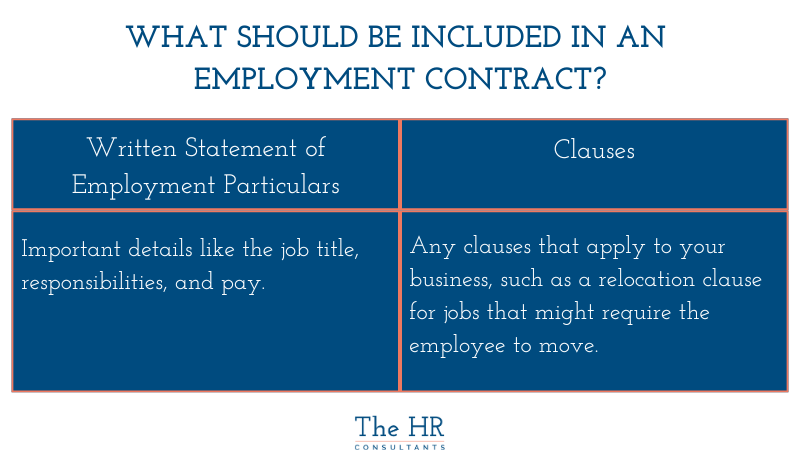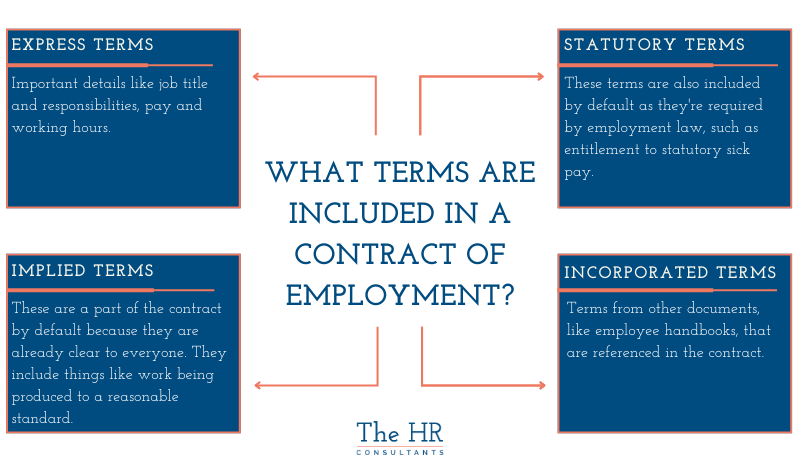"If you're not sure what should be included in an employment contract, The HR Consultants are here to guide you every step of the way. With extensive experience in UK employment law, we’ve helped countless businesses create contracts that are clear, compliant, and designed to protect both employer and employee.
In this guide, we’ll break down exactly what should go into an employment contract, offering practical advice to make the process straightforward and stress-free.

What is an Employment Contract?
An employment contract is a legally binding agreement between you and your employee that outlines the terms of their role and the employment relationship in general. As soon as an employee accepts a job offer, the contract is considered in effect, even if the details haven’t been put on paper yet.
Whilst a contract of employment can be verbal, putting it in writing is always a good idea. Here’s why:
- A written contract ensures you’re compliant with employment laws and helps prevent disputes down the line.
- It sets clear expectations for roles and responsibilities, reducing the chance of misunderstandings.
- It allows you to include important clauses, like confidentiality, intellectual property, or non-compete agreements, to protect your business.
What is the Law on Employment Contracts?
In the UK, employment contracts are shaped by key laws designed to protect both employers and employees. Here’s a quick overview of employment law:
- Employment Rights Act 1996: Requires employers to provide a written statement of employment particulars by the first day of work (for all employees hired after April 6th 2020). This can be included in the contract of employment or provided separately.
- The Equality Act 2010: Ensures equal pay and terms for men and women doing equal work by automatically including a sex equality clause in all contracts.
- The Working Time Regulations 1998: Sets rules around working hours, rest breaks, and holiday entitlement.

What Should Be Included in an Employment Contract?
Most employers choose to include the written statement of employment particulars as part of the contract, which keeps everything in one place. This is split into two parts: the principal statement, which must be provided on or before the employee’s first day, and the wider written statement.
Here’s what each part should include, as outlined by Acas (the Advisory, Conciliation and Arbitration Service).
The Principal Statement
The principal statement is the foundation of any employment contract, covering all the must-know details about the role. Legally, it has to be given to employees no later than their first day. Here’s what it includes:
- Employer and Employee Details: The names of both you and your employee, making it clear who the agreement is between.
- Start and Continuous Employment Dates: When the role officially begins, plus the date uninterrupted employment started.
- Job Details: The employee's job title, a description of duties, and the workplace address—or multiple locations if the employee will work across different sites.
- Pay: How much the employee will earn, how and when they’ll get paid.
- Hours: Working days and hours, and whether flexible arrangements apply.
- Leave Entitlements: Details of holiday pay, sick pay, and any other paid leave the employee is entitled to, along with how these will be managed.
- Benefits: This includes contractual benefits like pensions and optional perks such as gym memberships or well-being programmes.
- Notice Period: How much notice either side needs to give if the employee resigns or if the role comes to an end.
- Job Duration and Probationary Period: If it’s a fixed-term or temporary role, this should be clearly stated. Include details of any probationary period too.
- Working Abroad: If the role involves time overseas, the contract should outline how pay, benefits, and working arrangements will apply.
- Training Requirements: Any compulsory training should be mentioned here, along with whether the costs will be covered by you as the employer.
The Wider Written Statement
The wider written statement is a follow-up to the principal statement, including additional details that aren’t as urgent but still legally required. You’ll need to provide this within two months of the employee starting.
It covers:
- Pensions: What pension schemes the employee can access and how they can join.
- Collective Agreements: Terms that apply to a group of employees, like union agreements or other collective arrangements.
- Non-Compulsory Training: Information on optional training opportunities and where employees can find more details.
- Disciplinary and Grievance Procedures: Clear guidance on how to raise a grievance or handle workplace disputes, with information on where to find the full policies.

Clauses in the Contract
Including the written statement within the contract is a great foundation, but there’s often more to think about, like whether you need clauses in the contract. Some common examples are:
Confidentiality and Intellectual Property Clauses
If your business handles sensitive information or creative assets, you’ll need to protect them. Include confidentiality clauses to ensure employees don’t share company secrets, and outline intellectual property rules to clarify ownership of any work they create while employed.
Relocation Clauses
If there’s a chance the employee might need to relocate for their role, include a clause that explains the conditions under which this could happen. Be clear about how much notice will be given and whether relocation support will be provided.

What Are The Main Terms of the Employment Contract?
Employment contracts are made up of different types of terms, all of which play an important role in shaping the working relationship between you and your employee. Acas clarifies that these are:
Express Terms
These are the details you and your employee specifically agree on, and they’re usually written into the contract as part of the written statement of employment particulars. Express terms cover things like job title, salary, working hours, holiday entitlement, and notice periods. Essentially, they’re the “big ticket” items that form the foundation of your agreement.
Implied Terms
Implied terms apply by default and are understood to be part of the agreement, even if they’re not mentioned in the contract. For example:
- Duty of care: Employers must ensure a safe working environment.
- Employee loyalty: Employees are expected to act in the best interests of the company.
Statutory Terms
Statutory terms are rights and obligations set by law. They apply automatically, regardless of what’s included in the contract. Key examples include:
- National Minimum Wage: Employees must be paid at least the legal minimum.
- Working Time Regulations: Covers maximum weekly hours and rest breaks.
Incorporated Terms
Sometimes, employment contracts refer to other HR documents or agreements, like a staff handbook or collective agreements made with trade unions. These incorporated terms are legally binding, even if they’re not written in the main contract.

How to Write an Employment Contract
Once you know what to include in your employment contract, the next step is to choose the right type of contract for the role. Whether it’s a permanent, fixed-term, or zero-hours contract, selecting the right one ensures it meets the needs of both your business and your employee.
You might be thinking about drafting the contract yourself or using a free online template—and that’s understandable. But here’s the thing: free templates can leave out important details, and creating a legally sound, well-drafted employment contract takes time and expertise.
That’s where The HR Consultants come in. As employment law consultants, we don’t just review contracts—we can help you create them from scratch, making sure every box is ticked and nothing is overlooked.
Why Choose The HR Consultants?
- We Create Contracts That Work for You Whether you need a brand-new contract drafted or an update to an existing one, we’ll ensure it’s legally compliant and easy to understand.
- Expert Advice Without the Jargon We cut through the legal speak and make everything easy to understand. You’ll get straightforward guidance that empowers you to make the right decisions.
- Support That Fits Your Business From helping with one-off contracts to managing ongoing HR challenges, our services are designed to work for your goals, budget, and team size.
- Quality You Can Rely On With over 20 years of experience, we bring energy, expertise, and a personal touch to everything we do. You’ll feel supported from the first chat to the final draft.
Get Started With Employment Law Services

Frequently Asked Questions
We've answered some of the most common questions on contacts of employment below.
What is typically included in a contract?
An employment contract typically includes:
- Basic details: Names of the employer and employee, job title, and start date.
- Pay and hours: Salary, how it’s calculated, and working hours.
- Leave entitlements: Holiday allowance, sick leave, and other paid leave policies.
- Notice periods: How much notice is needed to end the contract.
- Additional clauses: Confidentiality, non-compete agreements, and intellectual property protections.
What happens if the terms of contract need to be changed?
Both the employer and the employee can request to change the terms of the contract, but they'll need to agree on the change for it to go through. It’s all about communication, agreement, and keeping everything clear and above board!
If you're an employer looking to change a contract of employment, follow the below steps.
- Start by explaining the reason for the changes and how they’ll impact the employee. For group changes, involve trade unions or employee representatives if needed.
- If they’re unsure, listen to their concerns and work together to find a solution. Forcing changes without agreement can lead to legal issues and potentially employment tribunal claims.
- Once agreed, update the contract and provide a written copy for the employee to sign.
What’s the difference between an employment contract and a written statement?
A written statement of employment particulars is a legal summary of key terms, like job title, pay, and working hours. The principal statement (the core part of the written statement) must be provided on or before the employee’s first day, with the rest delivered within two months.
An employment contract goes further. It usually includes everything in the written statement but can also cover additional terms, like confidentiality agreements or intellectual property clauses. Unlike written statements, an employment contract doesn’t have to be in writing—it can be agreed verbally."












